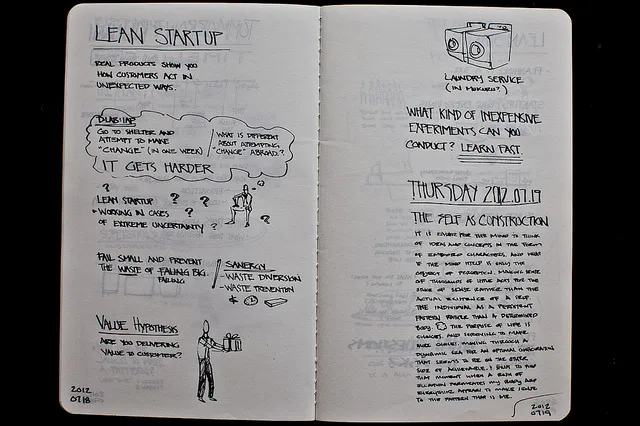Lean Startup is a methodology/movement taking over the startup universe. Lean Startup Conferences, startup weekends, numerous meetups, LinkedIn groups, blogs, podcasts and most business incubators worldwide inundate us with Lean Startup evangelization. As with most buzzwords, it has grown to where people talk about it – without really understanding it. To that end, this is our multi-part attempt to share the most important aspects of this terminology in some depth. In this first part, we will cover the basics.
So What Is It About?
Lean Startup, at its core, attempts to answer the quintessential question: Why build anything? Not just what to build, or how to build. It is a compilation of various components of business – strategy, marketing, analytics, experimentation, expectation setting, execution, etc. It engenders and overlaps approaches such as Customer Development, Agile Methodology, Lean Manufacturing, and is really an application of the Scientific Method. I like how the author Eric Reis has boiled all of these elements down into an actionable set of principles and practices. He targets starters within large enterprises with his message too, but for the sake of this series, I will begin by focusing on startups.
Why Do We Need It?
Traditional entrepreneurs are faced with analysis overload. They are burdened with extensive planning, forecasting, market research, etc. that fosters large investments with a “build it and they will come” approach. At the other end of the spectrum, management-averse startups build with little planning, rely completely on intuition and often don’t have a deep understanding of their customers. Founders have gazed into the abyss with, usually, little more than a hunch on what to do next. Such tactics usually result in disaster.
Here is a list of some common problems faced by startups:
- Wrong attribution of risk: Startups think their risk is around quality and/or functionality risk but really their biggest risk is that the solution itself is misguided or non-monetizable.
- Mishmash of concepts: Applications go after conflicting user demographics or try to please too broad an audience. Customer usage paradigms are not well understood, and this leads to an inconsistency of experience.
- Feature overdose: Founders are so convinced that their first launch will guarantee success that they want the best, most feature-filled release up front. This is an inappropriate expenditure of resources.
- Lack of expectation setting: What kills a lot of startups is not thinking beyond the initial launch. They tend to approach it with an all or nothing approach, putting all resources into one basket rather as a process that will take many iterations.
- HiPPOs: Highest paid individuals make the decisions based on their own experience/intuitions and little market/customer validation. This is a big risk.
- Lack of taking measurements or not knowing what to measure. In order to know whether you are headed in the right direction analytics and metrics are essential. Vanity metrics (number of downloads, number of hits, etc.) must be replaced with actionable metrics suited to the particular application.
- Analysis Paralysis: In an effort to fend off intuition based decision making, managers may spend an inordinate amount of time theorizing about the markets, competitors, pricing, etc. and burn a lot of budget with little to show for it.
What Are Some Basic Premises?
So we understand the problems faced, and we also know that the vast majority of startups fail. So the Lean Startup approach aims to improve your chances but if failure is imminent, then it minimizes the effort you expend in the process. In other words, “fail fast, succeed faster”. In order to do that, we espouse some principles:
- A Startup is not a business. Not yet anyway. From Steve Blank: “A startup is a temporary organization designed to search for a repeatable and scalable business model.” Knowing this means you understand that it is not about a product, and that it could take many iterations to get there.
- Expectations must be set to treat all activities as a set of experiments targeted at gleaning insights and learning. All features need usage data to confirm/reject the hypotheses.
- True learning and insight only comes from customer interaction, behavior observation and their measurement. Theory, secondhand knowledge or debate is overrated.
- Care must be taken to think about what the relevant hypotheses are. Experiments can be conducted relatively inexpensively. Be creative and audacious in finding the shortest paths to hypothesis validation.
- The faster the cycle of building, measuring and learning, the faster the startup can move on to becoming an enterprise. Therefore, build in the smallest increments of value, have your metrics ready and roll out quicker.
- Progress is to be measured in terms of how much learning has been validated, and whether a pivot of strategy is needed. Ignore vanity metrics, embrace actionable metrics.
- Success is gleaning customer insights and delivering solutions that address them – faster than your competitors do. Intuition, creativity, experience and perseverance very much have a place, but they are not allowed to be stumbling blocks that prevent pivots, where warranted.
Where It Came From.
Entrepreneuer, academician and author Steve Blank wrote the best seller “The Four Steps of the Epiphany,” in 2005. This inspired Eric Ries (Blank’s former student). He is the author of the best seller, “The Lean Startup,” published in 2011. Ries developed the philosophy in 2008 and trademarked the term. He described the philosophy as an application of lean thinking. That and other origins of this methodology, complemented Agile Practices, and a host of other influences.
What It Isn’t.
A boilerplate process that guarantees success. You may or may not succeed, but at least you won’t waste too many resources to find that out. Once you have achieved Product/Market fit, be prepared to burn through resources quickly to capture the market.
The Takeaway?
Many think that startup risks stem from execution deficiencies, quality issues, cost of development, funding shortfalls, etc., but the critical risk is “product to market fit,” a/k/a working on the wrong thing.
My 2 cents.
The Lean Startup concept has a lot to offer startups as well as larger enterprises. The essence is this: Knowing what is worth building. You do that by constant customer validation / experimentation and breaking cognitive biases. At Informulate we employ a variety of tools and practices that derive from this philosophy that are high value to our clients. We will get into those in more detail in following posts.
How Does The Lean Startup Accomplish Its Principles?**
Read our next post. :p
And now that you know this, go read the book!
Picture courtesy of Nathan Cooke.




